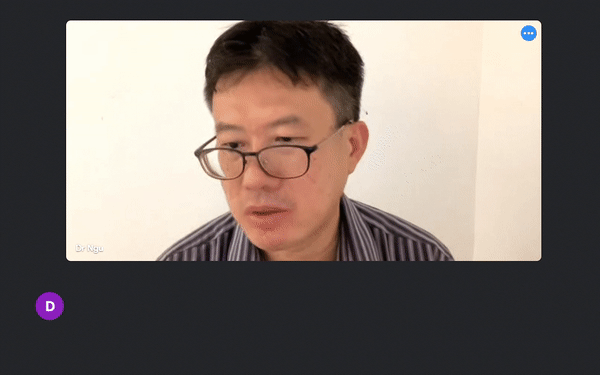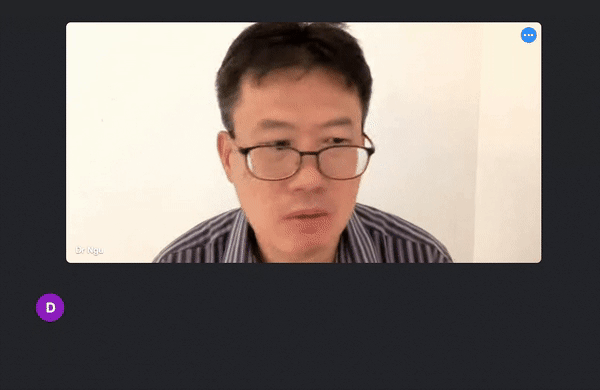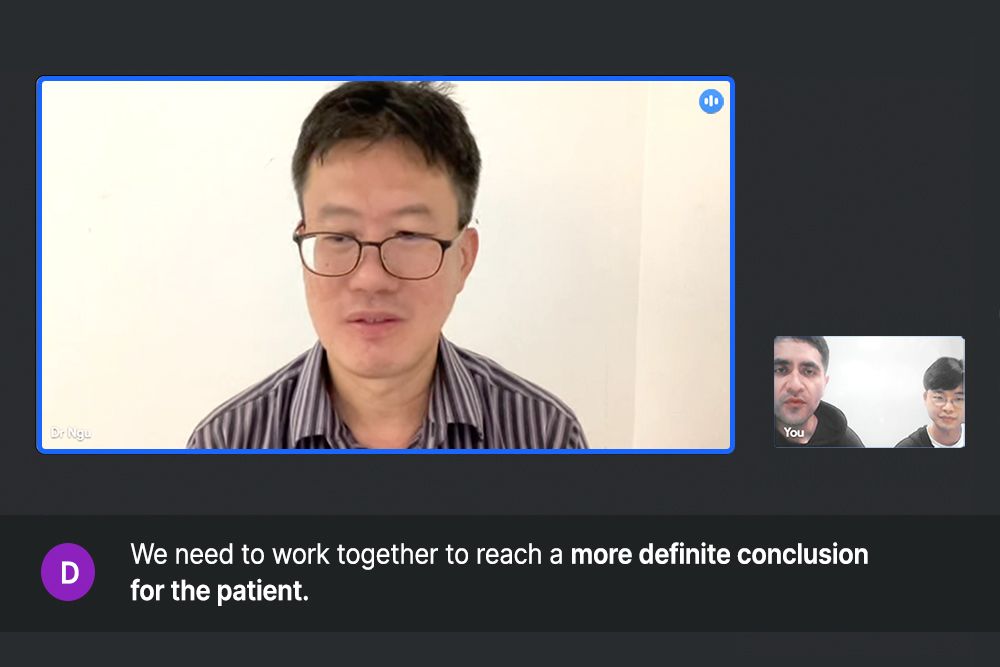Interview with Dr. Lock Hock Ngu, doctor with medical genetics
‘The Good Doctors’ is a programmed series of interviews to meet doctors who encounter patients with rare diseases every day and hear their stories. These interviews were planned to provide better insight for physicians by asking how genetic testing for rare diseases is conducted, how it’s used at their clinics, and how it can be improved.
Our second guest is Dr. Lock Hock Ngu from Kuala Lumpur Hospital, Malaysia.
Dr. Lock Hock Ngu, MBBS (Malaysia), MRCP (UK), and fellowship in Clinical Genetics (Malaysia) is a Consultant Clinical Geneticist & Pediatrician and the Clinical Lead in Inherited Metabolic Diseases at the Genetics Department of Hospital Kuala Lumpur. The institution serves as Malaysia’s national referral center for inherited metabolic diseases and genetic disorders.
This week, Juan from our global sales department led the interview.
How long have you been a doctor?
Juan
Hello, thank you for joining us in this interview series Dr.Ngu. I really appreciate your time and effort in this dinner-time interview. (The interview was held at 6:30 pm in Kuala Lumpur time)
Dr.Ngu
No problem. Thank you for inviting me!
Juan
First, I would like to start this interview with how you started your career in the medical field. How long have you been a doctor?
Dr.Ngu
I graduated from Medical School in 1997. So it has been 25 years.
How do you see yourself as a doctor?
Juan
That is quite a long time you have worked as a doctor. Since you have had so much experience helping patients and working in the field, can you tell us how you see yourself as a doctor?
Dr.Ngu
I would like to consider myself as ‘conscientious’ and ‘professional.’
How did you first come to learn about medical genetics?
Juan
While working as a doctor for 25 years, have you been primarily focused in the field of Medical Genetics from the beginning? Or did you start in a different field and then transition into Medical Genetics?
Dr.Ngu
I first trained in general pediatrics and then I transitioned into specializing in medical genetics in 2002. So I have now been in the genetic field for 20 years.
Juan
Was there a reason you chose to transition into medical genetics?
Dr.Ngu
When I was a general pediatrician, I encountered several children who were not diagnosed. I knew that something was not right with them, but I could not come to a definite diagnosis. In this way, I got interested in inherited metabolic diseases and this was the first time that I got interested in the genetic field. Actually in Malaysia, inherited metabolic diseases are quite common.
In this way, I became interested and began my training in genetics here in Malaysia and also in the Netherlands.
Is there a special case you remember of diagnosing a patient with exome or genome testing?
Juan
You mentioned that you transitioned into medical genetics due to children that were going through their own diagnostic odyssey. Is there a specific patient that comes to mind, or do you think that influenced your decision?
Dr.Ngu
Yes, of course. There was a child suffering from metabolic acidosis, and he had other siblings that had passed away due to an unknown cause. I was very curious and wanted to help by putting an end to the agony of the parents. You know, they lost their children.
We found that this child suffered from a rare condition, Methylmalonic acidemia. We tried to provide the necessary support and treatment. During that time, we did not have much economic support as well as experience and expertise in the field, with a small number of treatment options available.
However, since 2002, we have seen that the field has slowly progressed (in Malaysia). Now we are able to treat more and more patients through genetic testing. In fact, in my clinic alone, there are a few hundred patients being treated currently. I feel so happy that I can help so many children and parents.
How widely used is genetic testing such as Exome, Genome or other tests used in Malaysia?
Juan
You mentioned the progress of genetics in Malaysia. How widely used is genetic testing such as exome, genome or other tests used in Malaysia?

Dr.Ngu
I must admit that we have made a lot of progress in Malaysia, but due to limited knowledge and awareness of genomic testing, there is still little utilization of genomic testing. But I had the opportunity given to me by 3billion three years ago to implement genetic testing on a larger scale. It was also an opportunity for me to learn a lot as well.
Having said that, in Malaysia among medical professionals; due to the limited knowledge and awareness of genomic testing, there is little utilization of genomic testing. Not many doctors have the knowledge to apply this new technology to help their patients and the local laboratories do not really offer this kind of testing. Getting help from other countries for our genomic testing like Korea has been very helpful for us.
Before working with 3billion, how often had you performed a genetic test?
Juan
Before working with 3billion, how often would you do a genetic test?
Dr.Ngu
I started using WES for my patients about 5 years ago. We always had to outsource this to labs in Europe or the United States. We could only send maybe 5 tests per month, due to affordability. This test is not cheap. Luckily we now have more options now, thanks to 3billion that I found to be more affordable with a reliable service. I was able to do a lot more tests since our collaboration.

What Makes Our Exome Testing Advanced?
Find out how our enhanced exome solutions deliver better coverage and accuracy.
Do you think there is a reason doctors may not be receptive to new diagnostic technologies/techniques?
Juan
Do you think there is a reason that some doctors may not be receptive to new diagnostic technologies and techniques?
Dr.Ngu
I think the main reason is due to lack of knowledge and awareness. When we first attended medical school, we never properly learned about it, and when we did, we only learned a small part. Basically, we are not equipped with all necessary knowledge about genomics. Some doctors are hesitant to use new technology and methods because they may have difficulties communicating the results to the parents. This is probably the biggest reason this technology (NGS) is underutilized.
What should clinical doctors look for to suspect a rare disease?
Juan
On the subject, what would you recommend to a physician that is not as knowledgeable about new technologies or genetic testing? Is there something they should look for when considering a genetic disease?
Dr.Ngu
I think the most important thing is that they must have curiosity (laughs). When the patients show something unusual or conditions they have not seen, we should review our initial treatments and start to look further. Maybe start looking into suspicious family history.

So just be curious! Do not just accept everything. Try to find out what is scientifically wrong with the patient. There are so many rare diseases, and we are not expected to know everything. So we must be able to recognize our limitations, the things we need help with, and that we should reach out to colleagues for their opinion. Doctors should try to reach out to experts in their respective fields, either within the local hospital, or internationally. It is a global world, and we can quite easily communicate with each other and have more experts involved. With networking, we can help many more patients.
What do you consider is the biggest barrier to a larger-scale implementation of genetic tests?
Juan
What would you consider is the biggest barrier to the larger-scale implementation of genetic tests?
Dr.Ngu
Obviously, there are various possible reasons and barriers depending on the local healthcare system. For example, in Asia, affordability is a huge barrier. Medical insurance usually does not cover these kinds of tests.
The other barrier is that we do not know what to expect from the result. Every time I get an email notification that a result is ready for one of my patients, I get very anxious (laughs). I ask myself, what was the finding? Sometimes you get surprised by getting a result that does not seem to fit the patient’s clinical phenotype.
I think interpretation is the most difficult part of genomic testing. We are not sure if we found the answer that truly explains the patient’s problem. Also because the genetic testing result may have wider implications, not just for the patient, but also for the family. We certainly do not want to have the wrong interpretation that could result in unnecessary treatment for the patients.
What can diagnostic companies do to help doctors more?
Juan
You mentioned a couple of barriers that exist. Is there anything that genetic companies can do to help reduce the barriers? Or help doctors in their practice?

Dr.Ngu
I think in this aspect, I must congratulate 3billion. It is very important that there is an open channel of communication between physicians and clinical geneticists. As a clinician, you know the patient well and the geneticists know the genetic test well. We need to work together to reach a more definite conclusion for the patient.
Every time we see a result that we don’t feel comfortable with, we write to 3billion’s clinical genetics division. Maybe a few times a week, or a month. And, I must say that the team at 3billion always responds fast, with responsibility. It is very helpful and allows us to be open to asking questions without hesitation.
Other companies can be less open to this type of open communication and questioning with their variant interpretation team (laughs). Often we are not able to communicate with the person in charge of the division.
Looking now at the patients’ side, what can be done to help the patients or what can be done so that more patients can access genetic tests?
Juan
Looking now at the patient’s side, what can be done to help the patients or what can be done so that more patients can have access to genetic tests?
Dr.Ngu
I would really like it if the tests became more accessible and affordable. Since affordability is always an issue.
Also, I would like genetic tests to be used earlier in the diagnostic process. One way is for lobbyists to have politicians involved in making these kinds of tests more available and affordable.
This is a necessary thing in our healthcare system to speed up the spread of genetic testing usage and do genetic testing first and cut down on unnecessary tests. We always start with various tests that are not genetic, increasing the costs for the whole. The people should be aware of this, so I hope that the people would push their country’s politicians to take action so that they can have more access to available genetic tests.
In Malaysia, we have a lot of patient support groups that bring forward this agenda to the policymakers and increase awareness for more resources to be allocated in this area. We have had some small success throughout the years, but there is still more that can be done.
Juan
That is very true. There is always more that can be done.
What do you want to achieve as a doctor moving forward?
Juan
We started this interview by asking you about your past, how you came into genetics, the present, and finally, I would like to ask about the future. What do you want to achieve as a doctor moving forward?

Dr.Ngu
I must say that I enjoy what I do, and I wish to continue doing this and helping more and more patients. I also wish that other doctors can join the field in the future to bring more benefits to patients and families.
Juan
That is a very heartfelt answer. Thank you.
How would you describe 3billion in one phrase?
Juan
Can you provide one phrase to help describe 3billion? We hope it is a tricky question.
Dr.Ngu
I would like to say… 3billion is a rare company with a big #heart!

Stay Informed on Rare Genetic Conditions
Get updates on the latest insights in rare disease diagnosis and genetic testing—delivered monthly.
Get exclusive rare disease updates
from 3billion.

Juan Alberto Aguayo
Developing strategies to enter new markets, focused on offering specialized molecular healthcare to underserved populations, creating global health impact.




